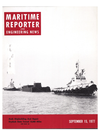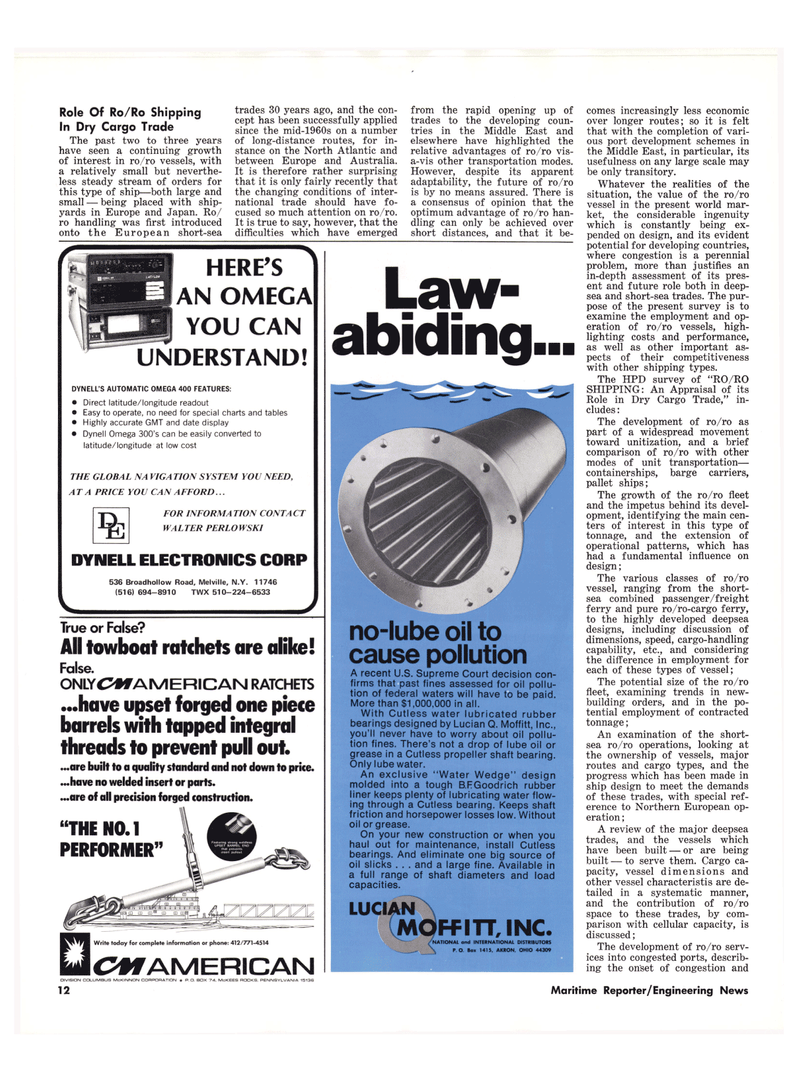
Page 8: of Maritime Reporter Magazine (September 15, 1977)
Read this page in Pdf, Flash or Html5 edition of September 15, 1977 Maritime Reporter Magazine
Role Of Ro/Ro Shipping
In Dry Cargo Trade
The past two to three years have seen a continuing growth of interest in ro/ro vessels, with a relatively small but neverthe- less steady stream of orders for this type of ship—both large and small — being placed with ship- yards in Europe and Japan. Ro/ ro handling was first introduced onto the European short-sea trades 30 years ago, and the con- cept has been successfully applied since the mid-1960s on a number of long-distance routes, for in- stance on the North Atlantic and between Europe and Australia.
It is therefore rather surprising that it is only fairly recently that the changing conditions of inter- national trade should have fo- cused so much attention on ro/ro.
It is true to say, however, that the difficulties which have emerged from the rapid opening up of trades to the developing coun- tries in the Middle East and elsewhere have highlighted the relative advantages of ro/ro vis- a-vis other transportation modes.
However, despite its apparent adaptability, the future of ro/ro is by no means assured. There is a consensus of opinion that the optimum advantage of ro/ro han- dling can only be achieved over short distances, and that it be-
HERE'S
AN OMEGA
YOU CAN
UNDERSTAND!
DYNELL'S AUTOMATIC OMEGA 400 FEATURES: • Direct latitude/longitude readout • Easy to operate, no need for special charts and tables • Highly accurate GMT and date display • Dynell Omega 300's can be easily converted to latitude/longitude at low cost
THE GLOBAL NA VIGA TION SYSTEM YOU NEED,
AT A PRICE YOU CAN AFFORD...
FOR INFORM A TION CONTACT
WALTER PERLOWSK!
DYNELL ELECTRONICS CORP 536 Broadhollow Road, Melville, N.Y. 11746 (516)694-8910 TWX 510-224-6533
True or False?
All towboat ratchets are alike!
False.
ONLYCJtf AMERICAN RATCHETS ...have upset forged one piece barrels with tapped integral threads to prevent pull out. ...are built to a quality standard and not down to price. ...have no welded insert or parts. ...are of all precision forged construction. "THE NO. 1
PERFORMER"
Write today for complete information or phone: 412/771-4514
OM AMERICAN
DIVISION COLUMBUS McKINNON CORPORATION * P. O. BOX "74. McKEES ROCKS. PENNSYLVANIA 15136 12
Law-abiding, no-lube oil to cause pollution
A recent U.S. Supreme Court decision con- firms that past fines assessed for oil pollu- tion of federal waters will have to be paid.
More than $1,000,000 in all.
With Cutless water lubricated rubber bearings designed by Lucian Q. Moffitt, Inc., you'll never have to worry about oil pollu- tion fines. There's not a drop of lube oil or grease in a Cutless propeller shaft bearing.
Only lube water.
An exclusive "Water Wedge" design molded into a tough B.FGoodrich rubber liner keeps plenty of lubricating water flow- ing through a Cutless bearing. Keeps shaft friction and horsepower losses low. Without oil or grease.
On your new construction or when you haul out for maintenance, install Cutless bearings. And eliminate one big source of oil slicks . . . and a large fine. Available in a full range of shaft diameters and load capacities.
LUCI Ff ITT, INC.
NATIONAL and INTERNATIONAL DISTRIBUTORS
P O Box 1415, AKRON, OHIO 44309 comes increasingly less economic over longer routes; so it is felt that with the completion of vari- ous port development schemes in the Middle East, in particular, its usefulness on any large scale may be only transitory.
Whatever the realities of the situation, the value of the ro/ro vessel in the present world mar- ket, the considerable ingenuity which is constantly being ex- pended on design, and its evident potential for developing countries, where congestion is a perennial problem, more than justifies an in-depth assessment of its pres- ent and future role both in deep- sea and short-sea trades. The pur- pose of the present survey is to examine the employment and op- eration of ro/ro vessels, high- lighting costs and performance, as well as other important as- pects of their competitiveness with other shipping types.
The HPD survey of "RO/RO
SHIPPING: An Appraisal of its
Role in Dry Cargo Trade," in- cludes :
The development of ro/ro as part of a widespread movement toward unitization, and a brief comparison of ro/ro with other modes of unit transportation— containerships, barge carriers, pallet ships;
The growth of the ro/ro fleet and the impetus behind its devel- opment, identifying the main cen- ters of interest in this type of tonnage, and the extension of operational patterns, which has had a fundamental influence on design;
The various classes of ro/ro vessel, ranging from the short- sea combined passenger/freight ferry and pure ro/ro-cargo ferry, to the highly developed deepsea designs, including discussion of dimensions, speed, cargo-handling capability, etc., and considering the difference in employment for each of these types of vessel;
The potential size of the ro/ro fleet, examining trends in new- building orders, and in the po- tential employment of contracted tonnage;
An examination of the short- sea ro/ro operations, looking at the ownership of vessels, major routes and cargo types, and the progress which has been made in ship design to meet the demands of these trades, with special ref- erence to Northern European op- eration ;
A review of the major deepsea trades, and the vessels which have been built — or are being built — to serve them. Cargo ca- pacity, vessel dimensions and other vessel characteristis are de- tailed in a systematic manner, and the contribution of ro/ro space to these trades, by com- parison with cellular capacity, is discussed;
The development of ro/ro serv- ices into congested ports, describ- ing the onset of congestion and 14 Maritime Reporter/Engineering News

 7
7

 9
9
